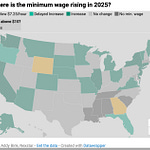Photo: Library of Congress. Some of the first recipients wait to receive [unemployment] benefits at the State Employment Service in San Francisco, California, 1938. Marketplace, 2020
Last week, I wrote a post critical of how the unemployment compensation system is being administered, particularly the expansive leeway given to states, and the disparity in the amount and distribution of benefits that result. Today, I’d like to share my recent experience with the unemployment system in Ohio to better illustrate the frustration and specific roadblocks anyone can face when they attempt to access government help.
Despite the research I’ve done for this newsletter and my personal experiences with these types of applications, I still don’t know whether it is a purposeful attempt by the government to deny monies to people in need, or whether it is simply the structure of government programs and lack of training to front line workers. Unfortunately, I lean toward the scholarly research that demonstrates it is at least in part, a purposeful effort to save money on the backs of the unemployed and poor, rather than “burden” business and the wealthy with additional taxes or legal requirements. Either way, it is a policy choice to keep the status quo, and that hurts all taxpayers.
For the most part, the people who write the laws don’t need to access programs like unemployment, food stamps, medicaid or home heating and cooling assistance, and likely never have, so they either can’t or won’t empathize with the millions of our citizens who must spend way too much time practically begging for help. Does the problem actually exist if you can’t see it, or if you don’t live with it? How many elected officials at any level of government have actually walked into (or waited for hours) in a county food stamp office or tried to make an appointment for home heating and cooling assistance? Additionally, our system has long favored business over people, which provides the foundation for both the negative attitude and structural bias against direct monetary aid to individuals.
I realized that my application for unemployment I filed last fall was not cut-and-dried — it had nuances that would likely make it complicated, which I won’t detail here. But after reading the statute and regulations, I was fairly certain I was entitled to receive unemployment benefits. Keep in mind that the unemployment laws are complicated, and unnecessarily so, but I had an edge because of my past law practice, or so I thought.
My initial application sat with no answer for over a month (they have 21 days to act on an initial application), until I called the state unemployment agency and was told that they couldn’t make a decision because my bank account information was not on file. It was, but I submitted it again. The next day, my application was denied with no substantive reasoning (legal or otherwise) to back up the decision.
I appealed this initial denial, and the unemployment agency denied it a second time, again with no substantive reason except reference to a rule that allows them to deny applications. Both of these decisions were made internally, meaning within the unemployment department.
My third appeal, however, was scheduled for a hearing with an outside, independent board called the Unemployment Compensation Review Commission, and an administrative law judge to preside over my case. The telephone hearing lasted barely 15 minutes, and that included my swearing in. My employer was invited to attend but was a no-show. I did mention to the administrative law judge that I was surprised there had been no legal reasoning to support the agency’s denials. Her reply was that the legal reasoning part didn’t happen until an appeal was brought before the review board and a judge reviewed it. I wondered how decisions are made on initial applications and additional appeals without applying the facts of each case to an understanding of the complex rules that apply to unemployment compensation claims, and then putting that reasoning in writing for the applicant.
The administrative law judge did not mention her thoughts about the case during our brief hearing, but she did say, and I’m only slightly paraphrasing, that given the relatively simple and straightforward facts of my case, I should expect a decision within a few days. The next morning, I received a detailed, written decision with full legal analysis that overturned the denials and determined I was indeed eligible for unemployment benefits.
Within a week, I received nearly four months of back unemployment benefits and continued to complete my work requirement searches for the remaining two months of my benefits. Within a couple of weeks, though, the unemployment agency was back at it: I received two separate notices that my unemployment benefits were being held up because… I supposedly didn’t have my updated resume on file (I did), and I inexplicably needed to resubmit most of the documents I had already submitted with my initial application, like my social security card, driver’s license, etc. And yes, the Agency once again requested my bank statements, as a way to confirm my correct address.
To sum up, it took three appeals and just over four months to receive unemployment benefits that never should have been denied in the first place. This cost the taxpayers time and money to review my appeals, and it cost me months of worry coupled with time-consuming and unnecessary tasks of uploading documents several times each, writing appeals, gathering information, all causing untold stress. Instead, I should have been able to spend my time completing job applications.
But it’s not just my specific case that’s the problem. It is systemic, as detailed in a September 2021 article from The Columbus Dispatch. Apparently, the Ohio legislature and both democratic and republican administrations have been “kicking the can down the road” for decades, failing to accomplish anything to reform the unemployment system, and using the usual disputes between labor and business as an excuse:
According to the U.S. Department of Labor, benefits paid last year as a percent of total wages sat at 1.56% in Ohio compared to 1.87% nationwide. The gap between those two figures was not as significant in 2018 and 2019, although Ohio was still slightly lower than the United States overall… But Zach Schiller of Policy Matters Ohio said the state's average benefits are below the national average and not enough to keep a family of three above the poverty line…Schiller also argued that Ohio claimants tend to find work before maximizing their benefits out at 26 weeks. ‘The notion that unemployment is somehow allowing people to maintain some high lifestyle, nothing can be further from the truth,’ he said.
I’m going to make a bold claim here and say that way too many people who are recently unemployed and living on the financial edge, just give up and never file the applications and appeals required to “fight the system”, and so never receive the benefits available to them by law. But don’t believe me, read this report from Bloomberg News stating that at least nine million people who applied for unemployment benefits during the pandemic, did not receive a penny.
Check out my Notes for a bit of additional information on unemployment benefit work requirements…
____________________________________________________________________________
What have your experiences been with unemployment benefits? Have you applied and been successful or were you denied benefits? Please share your thoughts in the Comment Section below.
If you are not already a subscriber, why not take this opportunity to join our community with a free or paid subscription? A new paid subscription or an upgrade from a free to paid subscription will allow me to expand this newsletter with additional, primary source information, like interviews and public information requests, and expanded podcast offerings to include real, live guests. Although I won’t be going on strike any time soon, the current TV writer’s strike demonstrates that writer’s deserve to be paid, and paid well for their work, just like any other profession. Thank you in advance for your financial support of my writing!














Share this post